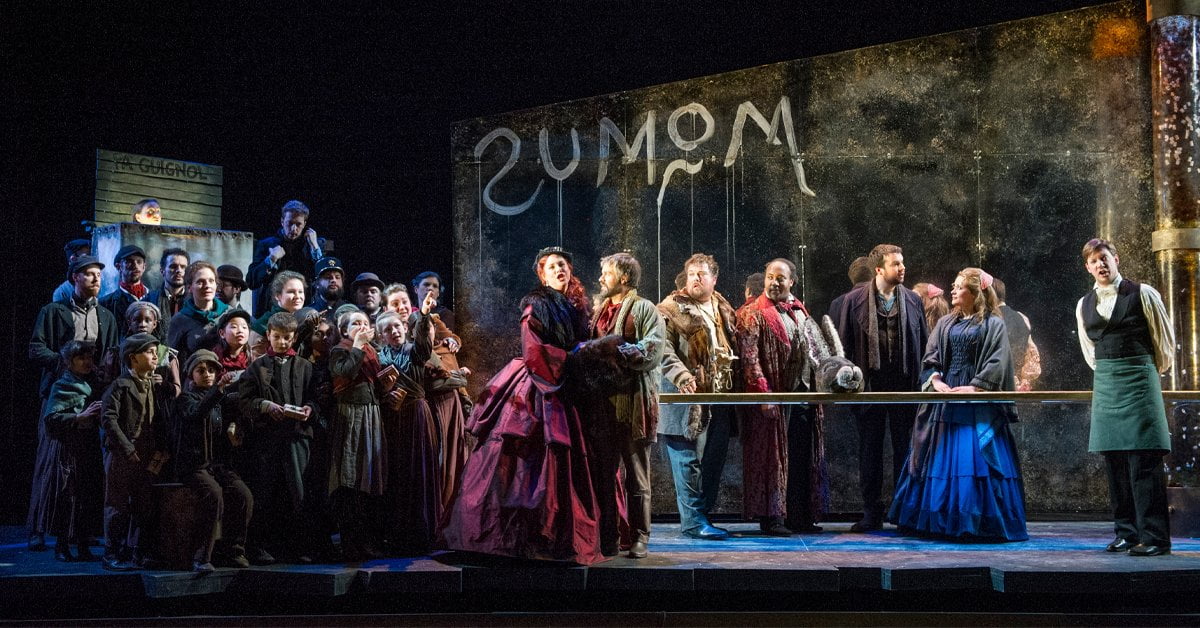English Touring Opera is currently visiting venues across England with two productions: a revival of James Conway’s 2015 version of Puccini’s La bohème (The Bohemians, 1896) and a new production of Rimsky-Korsakov’s The Golden Cockerel (1909). I saw the former at Cambridge’s Arts Theatre on Saturday night (23 April).
La bohème is one of the world’s best-known operas; there are several new and revived productions being staged this year and it has been reinterpreted many times. This version sticks closely to the original story of the opera to create a production that is both classic and beautiful.
The four main roles are shared between two singers. The night we went, British tenor Thomas Elwin was singing Rodolfo, Brazilian baritone Michel de Souza was Marcello, the part of Mimì was played by American soprano Paula Sides and Musetta was sung by British soprano April Koyejo-Audiger. Canadian bass Trevor Elliot Bowes as Colline and Zambian-born baritone Themba Mvula as Schaunard round out the main cast.
The opening act is wonderful. The scene between our four bohemians and their landlord Benoît (sung with verve and vigour by Scottish tenor Matthew McKinney) is boisterous and laugh-out-loud funny. The contrast with Rodolfo and Mimì’s first scene together couldn’t be greater. This is touching, amusing and intimate.
This counterpoint between humour and tenderness is also prevalent in Act IV, when we go from a highly amusing dance featuring the four friends to the tragedy of Mimì’s death.
Both Elwin’s and Sides’s voices are stunning. The opening aria of Scene II – ‘Mi chiamano Mimì’ (‘They Call Me Mimì’) – is particularly arresting, and Sides is expressive throughout the whole production.
Koyejo-Audiger’s Musetta is by turns coy and coquettish and sexy and in control. In her scenes with Marcello she’s a force to be reckoned with. In fact both the female roles in this production feel like they have more agency than is often granted to women in opera. But we also see her goodness when she brings Mimì to the garret in the final scene; she clearly cares for the dying woman and her love for Marcello feels real.
Mvula makes for a vivacious Schaunard, while Bowes’s Colline is thoughtful and intelligent – the ideal philosopher. The children’s chorus in Act II is suitably adorable.
The set design by Florence de Maré and Neil Irish is understated and rather stark, befitting a touring production that is playing in smaller venues. The orchestra is expertly handled by conductor Dionysis Grammenos. The music is truly moving, underscoring the emotion played out on the stage.
One addition I didn’t fully understand came in Act IV, with Schaunard coughing blood into his own handkerchief as Mimì lies dying. Maybe it’s meant as a reminder that tuberculosis wasn’t that rare among such poverty-stricken artists and that Mimì’s death is one that will be played out many times more. But it isn’t something I’ve seen before and seemed rather random and disconnected from the rest of the story.
Overall, though, this traditional interpretation of Puccini’s much-loved masterpiece is intimate yet powerful. It’s a funny, moving and beautiful production. It’s also very accessible. I watched it with my mum; it’s the first opera she’s seen live and she loved it.
La bohème is touring to venues across England along with The Golden Cockerel until 3 June. Tickets are on sale now, with information on venues, dates and times available from English Touring Opera. It’s sung in Italian with English surtitles with a run time of 2 hours and 5 minutes, including a 20-minute interval.
Image
English Touring Opera’s revival of James Conway’s 2015 production of Puccini’s La bohème is touring to venues across England until June.

